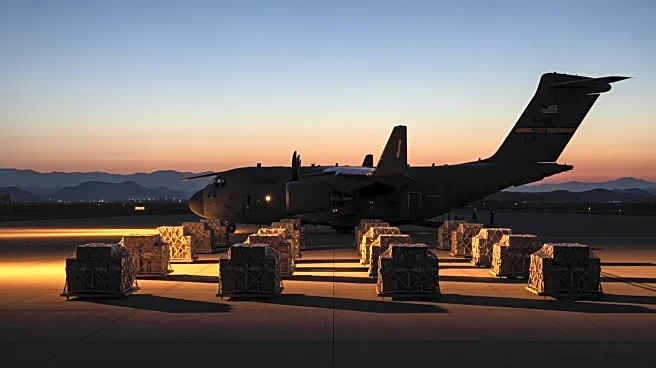What's Happening?
The interim government in Syria is conducting its first parliamentary election since the ousting of former President Bashar Assad. The election process, however, has been met with widespread skepticism and confusion among the Syrian populace. Many residents in Damascus were unaware of the election, with no visible signs such as candidate posters or public debates. The election involves electoral colleges voting for two-thirds of the People's Assembly seats, while the remaining seats are appointed by interim President Ahmad al-Sharaa. This approach was chosen due to the displacement of many Syrians and loss of personal documentation during the civil war. The election process has faced criticism for its lack of inclusivity and transparency, with concerns about the credibility of the transition process.
Why It's Important?
This election marks a significant step in Syria's political transition following the fall of Assad's regime. The process is crucial for establishing a new legislative framework and addressing the 'legislative vacuum' left by the dissolution of the former parliament. However, the skepticism and lack of awareness among the public highlight challenges in achieving a credible and inclusive political transition. The outcome of this election could impact Syria's future governance and stability, affecting both domestic and international stakeholders. The process's credibility is vital for gaining public trust and ensuring effective representation of diverse groups within Syria.
What's Next?
The election results will be closely monitored to assess the effectiveness of the new political system. Stakeholders, including Syrian activists and international observers, will likely scrutinize the process for transparency and inclusivity. The interim government may face pressure to address criticisms and improve the electoral process in future elections. The broader implications for Syria's political landscape will depend on the ability of the newly elected assembly to represent and address the needs of the Syrian people, particularly in light of ongoing economic and social challenges.
Beyond the Headlines
The election process raises questions about the ethical and legal dimensions of political transitions in post-conflict settings. The exclusion of independent observers and the compressed timeline for candidate presentations may undermine the legitimacy of the process. Additionally, the sectarian violence and skepticism among religious minorities highlight cultural and social challenges in achieving a unified national identity. Long-term shifts in Syria's political culture will depend on the ability to foster inclusive dialogue and representation across diverse communities.









